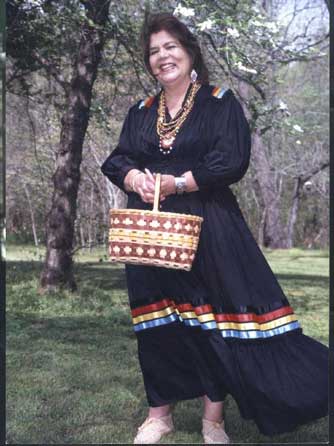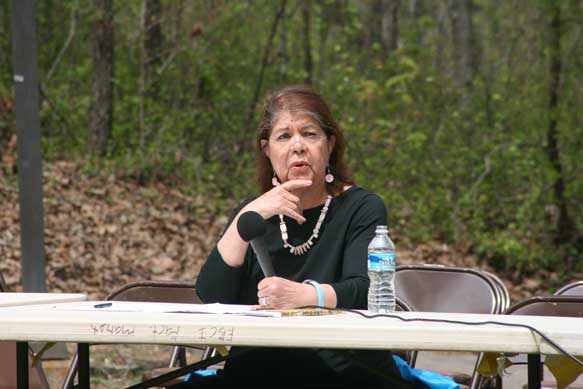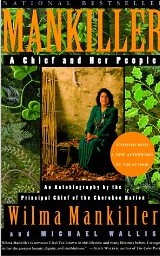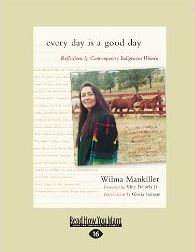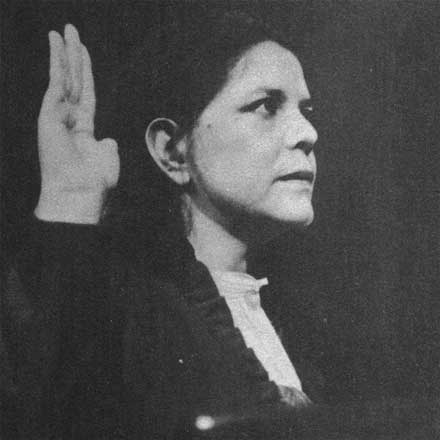Wilma Mankiller: ‘Her gift to us is the lesson that our lives and future are for us to decide. We can carry on that Cherokee legacy by teaching our children that lesson.’‘Everyone Was In Awe Of Her’
Wilma Pearl Mankiller
November 18, 1945-April 6, 2010by Rob Capriccioso
With a last name like hers, some say Wilma Mankiller was destined for the history books.
But many friends and admirers nationwide aren’t waiting for those historical tomes to be written. Thousands of newspaper articles, Internet messages, and other tributes and remembrances have already surfaced in honor of the first woman elected to lead the Cherokee Nation, who passed away at age 64 on April 6 after a battle with pancreatic cancer.
The outpouring of adulation, which has included praise-filled statements from President Barack Obama, former President Bill Clinton—who awarded her the Presidential Medal of Freedom in 1998—and Secretary of State Hillary Clinton, is not surprising to those who knew her best.
“She had the uncanny ability to make people in Native America and beyond feel like she was talking right to them,” said Tom Holm, a longtime friend and noted Native American scholar.
“She was one of the great American Indian thinkers. We have lost a voice that can’t easily be replaced.”
It was through her tribal roots that Mankiller became a nationally known figure after her service as principal chief of the Cherokee Nation, which began in 1985. She served with great popularity in that position for 10 years, and was deputy principal chief for two years before that.
“Wilma exemplified a Native woman’s leadership, both in her manner and in her consistent and unfailing devotion to her family, her people, the land, and the ways in which we are connected to past and future generations.”—Rebecca Tsosie, an Indian law professor at Arizona State UniversityHer legacy at the Cherokee Nation, which opened its enrollment during her leadership to ultimately become the second largest tribe in the United States, is firmly entrenched. It was under her tenure that multiple educational, health and economic development initiatives took hold.
Among Mankiller’s many successes, she oversaw the substantial revitalization of the tribe, including several new free-standing health clinics, an $11 million Job Corps Center, and greatly expanded services for children and youth. She also led the team that developed the core of what’s now known as Cherokee Nation Enterprises.
Chad Smith, current Cherokee Nation principal chief, said after her passing that his tribe is a “stronger tribal nation because of her example of Cherokee leadership, statesmanship, humility, grace, determination and decisiveness.”
Mankiller’s legacy extended far beyond the borders of her tribe. A heroine of the women’s rights movement, she spent countless hours devoted to philanthropic work after her time as chief, serving on numerous minority and women-focused boards, including those of the Ford Foundation, the Ms. Foundation for Women, the Seventh Generation Fund, Women Empowering Women for Indian Nations and the Freedom Forum.
Wilma Mankiller, ‘Living A Good Life’: Speaking at Oklahoma State University on November 3, 1998, at the opening of the Women of Hope art exhibit.She also wrote two books about her life and heritage, and taught numerous Native American studies courses at learning institutions throughout the nation.
Susan Masten, founder and co-president of WEWIN, said Mankiller’s tireless advocacy on behalf of Native American females was but one spoke in her wheel of influence.
“She really did so much to improve the lives of so many,” said Masten, who invited Mankiller to serve as a founding board member of WEWIN in 2004. “Yes, women’s issues are a huge part of her legacy, but she was a pioneer in so many ways.”
When Mankiller decided to retire from the tribe in 1995, still as popular as ever, she hinted at her journeys yet to come, citing the biblical verse, “To everything there is a season. My season here is coming to an end.”
A video tribute to Wilma P. MankillerThe New York Times documented that farewell scene, reporting that many tribal employees were in tears at the prospect of losing their beloved leader.
But Mankiller did not dwell on the sadness. She kept her speech short, hugged her friends, and told the Times that she was ready to begin a new chapter. “You don’t have to have a title or a position to be effective,” she said then.
And she was true to those words. Soon after retirement, she returned with conviction to make waves on the national scene, accepting a fellowship at Dartmouth College to teach students and faculty members a smattering of her lifelong messages.
But she wasn’t one to go easy on her new friends in academia simply because they had invited her. Instead, she was quick to note the lack of diversity sometimes found in segments of that world.
“The people [who] don’t have a lot of interaction with minority people or with women in leadership roles or with Native Americans, they are the ones we ought to be talking to,” Mankiller told local New Hampshire press.
Many of Mankiller’s truisms in the years after her two terms as principal chief hit on the importance of sharing Native American realities and wisdom with non-Indians, especially those who have tended to be ignorant.
During a 2008 appearance on National Public Radio, she hinted that much work was left to be done on that matter, discussing the many wrong notions she had encountered about Native America throughout her travels.
“I think that in virtually every sector of society, Native people, whether they’re in tribal government or whether they’re in the private sector or an artist, they encounter people every day who have such enormously stupid, ridiculous stereotypes about Native people and have so little accurate information about either the history of Native people or their contemporary lives,” she told host Michel Martin.
Mankiller saw herself as a conduit for information, Holm recalled, saying that’s part of why she was such a popular Vine Deloria Jr. Scholar at the University of Arizona in 2009.
“The students, the professors, everyone was in awe of her,” said Holm, himself a longtime scholar at the institution.
“I think a lot of them were surprised I knew her, that I could get such a big name to show up,” he said with a laugh, noting that they had been friends for many years.
Mankiller’s time at Dartmouth and Arizona were just two of her many teaching adventures after her days of tribal leadership. In addition to co-writing two books, Mankiller: A Chief and Her People and Every Day Is a Good Day: Reflections by Contemporary Indigenous Women, she would go on mini-tours of campuses, staying for a few days to share some passages or a speech, and to meet her followers.
‘To me, she exemplified a Native woman’s leadership, both in her manner and in her consistent and unfailing devotion to her family, her people, the land, and the ways in which we are connected to past and future generations. She knew these things, practiced them, and had such a determination to make sure that this would be protected into the future.’Rebecca Tsosie, an Indian law professor at Arizona State University, is one of many fans who fondly remember meeting Mankiller after one of her public inspirational speeches.
“There are some people who have this rare quality, I guess ‘luminous’ is the best word. That is how I will always remember her. She was powerful, but in a way that was so kind, so compassionate.
“As amazing as she was, however, she also had a way of just sitting down with you, like an old friend, chatting and laughing about some small thing that struck her as amusing,” Tsosie said.
“To me, she exemplified a Native woman’s leadership, both in her manner and in her consistent and unfailing devotion to her family, her people, the land, and the ways in which we are connected to past and future generations. She knew these things, practiced them, and had such a determination to make sure that this would be protected into the future.”
Ron Karten, a writer with the Confederated Tribes of Grande Ronde, was in the audience during one of Mankiller’s famous public conversations, one she shared with former American Indian Movement leader John Trudell at the University of Oregon in 2005.
Like so many who saw her in such venues, Karten was impressed that despite her health obstacles—she carried a cane at that outing—she was “incredibly knowledgeable” and even a little bit “feisty.”
Mankiller showed some of her spirited energy during that talk with Trudell, lamenting of non-Indians, “After hundreds of years of living together, they know so little about us.”
And she discussed feminism in contemporary times, saying that “every woman figures out her own way to deal with sexism.” In her case, she said she made her mark among the men at the table by pulling her own seat up, and getting down to business.
“I never thought about being a woman,” she remarked. “Nobody told me I couldn’t do anything.”
She also said it was important not to let society define what it is to be a woman.
“Girls and women have to have their own identity, not from their boyfriends or husbands. Define it for yourself in your own way,” she said.
Representing the Second Congressional District of Oklahoma, Congressman Dan Boren introduces a resolution honoring Chief Wilma P. Mankiller, April 14, 2010Sara Gould, Ms. Foundation president, was quite familiar with the tribal leader’s role in the women’s rights movement, having worked with her for several years when Mankiller served on the board of that organization.
“I turned to Wilma many times for ideas on bringing women together, to help us move our shared endeavors forward.”
Gould said Mankiller’s contributions made Native American women much more visible to people who would have had no understanding of them otherwise.
“Most Americans haven’t visited a reservation; they really have little clue about Native Americans. Wilma really was able to speak about her experience, and get other women thinking about it.”
Elouise Cobell, no stranger to being a celebrated Indian leader, said she and many Native American women viewed Mankiller as a role model and a pioneer.
“She showed that women could aspire to – and achieve – major leadership positions in our Native communities,” the Blackfeet citizen said.
Through Mankiller’s personal health struggles, including the ramifications of a horrific car accident in 1979, two kidney transplants, lymphoma and breast cancer, she also became an advocate for Indian health issues.
Raining Deer Harjo, an author and motivational speaker, quoted Mankiller in one of her writings focused on surviving breast cancer. She said that it was the courage of people like the former Cherokee chief who helped her make it through her own ordeal.
“I still lean on her words.”
Larger than any of her commitments to various issues, foundations, books and public appearances, Masten said Mankiller’s greatest source of satisfaction was her family.
“She had a strong Cherokee husband, Charlie Soap, who supported her, went with her everywhere, loved her so much—it was a beautiful thing.
“And her daughters, Felicia and Gina, were always traveling with her, or helping her in her endeavors. It was through her family that Wilma found the strength to be the courageous woman she was to so many people.”
Mankiller’s extended family, including good friend Gloria Steinem, one of the top leaders of the contemporary women’s movement, was also a substantial source of strength, Masten said.
Even after the Cherokee heroine knew she would succumb to pancreatic cancer, she opened herself to the world, sharing her personal e-mail address in her last statement to the public, issued in early March.
“I learned a long time ago that I can’t control the challenges the Creator sends my way, but I can control the way I think about them and deal with them,” Mankiller wrote in her final message.
“On balance, I have been blessed with an extraordinarily rich and wonderful life, filled with incredible experiences. And I am grateful to have a support team composed of loving family and friends.”
She continued her advocacy work, striving to get a Native American studies department established at Northeastern State University, at which she was a scholar.
Even in death, Mankiller managed to keep her strong spirit alive, asking that any gifts in her honor be made as donations to One Fire Development Corporation, a nonprofit dedicated to advancing the economic development of Native American communities.
“She definitely wasn’t one to rest on her laurels,” Holm said. “She kept on going until the last day. Now, the next generations have to keep up her pace.”
Published: Apr 8, 2010 at the blog, “A Radical Profeminist”
***
Reader Doris Hale posted this review online:
I spent a whole weekend not just reading but absorbing this work of Wilma Mainkiller. On Sunday I could only describe feeling wonderfully enriched by the experience both personally, as a Euro- and Native American person and also as an American. All of us have been denied major parts of our comon American history with the repression of Native American History. The mid section of the book is purely historical, and so much of it was news to me! (I thought that I knew Native history and yet it would prove that I had alot to learn that weekend.) The interaction of Cherokee and African American history is fascinating ! It is a reoccuring theme. What history books cover that? The focus is usually Euro-American to Native American, or Euro-American to African-American. At a personal level the experience was tremendous. Putting personal information together with her history, I learned that I have a matrilineal clan affiliation (bird). I feel that as the result of her work me, my family, and descendants have connected with something that would have otherwise been lost. Generations ago, two orphaned Cherokee boys were adopted by a white family in Georgia. One later went "white” the other "red.” This is not just my personal background. This is a metaphor for so much of American history. Truly, Cherokee culture is the best-kept secret in America today, as the author writes. It is our common cultural heritage, like jazz, like democracy. I relish reading other works by this author!Reader D. Needell posted this review online:
Wilma Mankiller, along with a distinguished and talented cast of other Indian women, have created a book to savor in Every Day is a Good Day. Their highly individual perspectives on spirituality, history, culture, and womanhood should appeal to men as well as women and people of all cultures. The book dispels a number of myths long held by non-Indians who may be well-meaning but poorly informed. As a woman, I was heartened by the indigenous woman's sense of herself as integral to the community, equal to the men of her tribe, happy being "brown and round" rather than caught up with negative body images and the superficial, youth-oriented and consumer-driven culture of much of mainstream America. Every writer speaks of the damage to indigenous culture wreaked by Eurocentric domination, but at the same time, these women offer a resilient, proud, and surprisingly optimistic view of today and tomorrow.This is a book to keep on hand next to your favorite chair or on your night stand. It is not literary fast food but a deep and expansive collection of thoughts to read and contemplate a chapter at a time.
***
‘My name is Mankiller…’
Wilma Mankiller: In Her Own Words
My name is Mankiller, and in the old Cherokee Nation, when we lived here in the Southeast, we lived in semi-autonomous villages, and there was someone who watched over the village, who had the title of mankiller. And I'm not sure what you could equate that to, but it was sort of like a soldier or someone who was responsible for the security of the village, and so anyway this one fellow liked the title mankiller so well that he kept it as his name, and that's who we trace our ancestry back to.
One of the things my parents taught me, and I'll always be grateful as a gift, is to not ever let anybody else define me; that for me to define myself . . . and I think that helped me a lot in assuming a leadership position.
I've run into more discrimination as a woman than as an Indian.
Prior to my election, young Cherokee girls would never have thought that they might grow up and become chief.
A lot of young girls have looked to their career paths and have said they'd like to be a chief. There's been a change in the limits people see.
One of the things my parents taught me, and I'll always be grateful as a gift, is to not ever let anybody else define me; that for me to define myself . . . and I think that helped me a lot in assuming a leadership position.
I think the most important issue we have as a people is what we started, and that is to begin to trust our own thinking again and believe in ourselves enough to think that we can articulate our own vision of the future and then work to make sure that that vision becomes a reality.
Individually and collectively, Cherokee people possess an extraordinary ability to face down adversity and continue moving forward.
The secret of our success is that we never, never give up.
Founder/Publisher/Editor: David McGee
Contributing Editors: Billy Altman, Laura Fissinger, Christopher Hill, Derk Richardson
Logo Design: John Mendelsohn (www.johnmendelsohn.com)
Website Design: Kieran McGee (www.kieranmcgee.com)
Staff Photographers: Audrey Harrod (Louisville, KY; www.flickr.com/audreyharrod), Alicia Zappier (New York)
E-mail: thebluegrassspecial@gmail.com
Mailing Address: David McGee, 201 W. 85 St.—5B, New York, NY 10024


